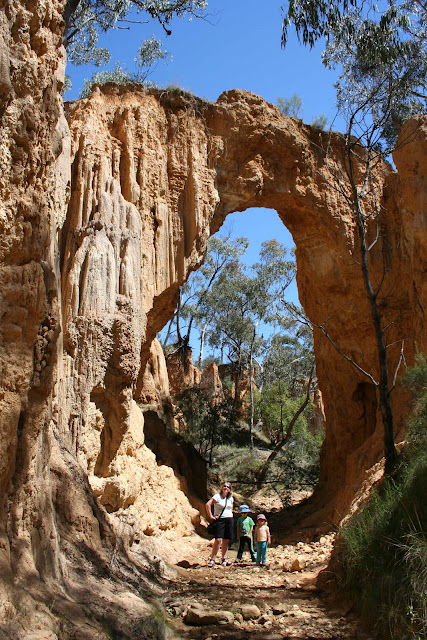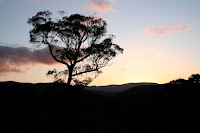Monday, 31 October 2011
History Street - Iron Age House
We have a book about the history of houses out on loan from the library. We read about an iron age house and looked at the design before constructing our own model. We talked about what it might be like to live in this house and how it is different to our own house. First we used lolly sticks and matches to make the frame, these would have been wood in the real house.
Next we added a thatched roof made with drinking straws. We needed fast drying glue for this (fabric glue/balsa cement).
Keep your eye out for our next building.
Charts And Graphs
R has been keeping a record of the weather over the last month. Today we worked on graphing our results. R learned how to make a tally chart, pictograph, bar chart and pie chart. I quizzed him on his graphs and he was able to interpret them well.
 |
| October's weather |
 |
| Tally chart |
 |
| Pictograph |
 |
| Bar graph made in Excel |
 |
| Pie chart made in Excel |
Saturday, 29 October 2011
Simple Bridge Experiment
 |
| Plank Bridge |
Today we challenged ourselves to make simple bridges using only 1 sheet of A4 paper. We talked about our previous experiment and decided triangles and cylinders were the way to go. We constructed a plain "plank" style bridge, a "corrugated" bridge (triangles), and a bridge using cylinders. We used Duplo to make the span for the bridges to cross.
The bridges were so strong that we didn't have enough weights to test them with so we used wooden blocks as well as regular weights, we found out how much a block weighed using kitchen scales.
 |
| Constructing a cylinder bridge |
 |
| Construction in progress |
 |
| Construction of the corrugated bridge |
 |
| R demonstrates how people walk across |
 |
| Testing the corrugated bridge |
 |
| Tested to destruction |
Here's our results;
- Plank bridge 50g
- Cylinder bridge 640g
- Corrugated bridge 1015g
Conclusion - triangles are strong shapes to use in bridge building.
We also watched a documentary about the construction of the worlds largest bridge in Japan - they used lots of triangles too.
History Street - Cave
We are just starting to investigate houses through the ages. We are going to make a model street with different dwellings from a variety of periods in history. Today we started with a cave dwelling. Luckily we had visited a small cave recently and seen some Aboriginal art works on the walls.
We hollowed out a ball of air dry clay to make a cave shape and left it to dry.
 |
| R at Blackfellows Hand Cave |
We hollowed out a ball of air dry clay to make a cave shape and left it to dry.
Next we used tiny hand print stencils to add the cave paintings.
Friday, 28 October 2011
Introduction To Strong Shapes
Today I introduced children to the concept of some shapes being stronger than others. First we talked about the types of shapes we had seen in buildings. We made squares and rectangles with mechano. We soon concluded they they weren't very strong as we could deform the shape easily. We added cross braces to create triangles and noticed how much stronger they were.
Then we had a look through our junk modelling box for more shapes. We reinforced a box with cross braces to make it stronger. They explored the strength of cylinders and found it depended on which way they were compressed. Next we will move onto a more scientific way of testing shapes (using weights) when we make some bridges.
 |
| Deforming a rectangle |
 |
| Adding a cross brace to make triangles |
Then we had a look through our junk modelling box for more shapes. We reinforced a box with cross braces to make it stronger. They explored the strength of cylinders and found it depended on which way they were compressed. Next we will move onto a more scientific way of testing shapes (using weights) when we make some bridges.
 |
| L can't compress the box as easily with the cross braces attached |
 |
| R finds that a cylinder is very strong in this orientation |
Tricky Word Puzzles
This week we had a go at making puzzles with our tricky words. We wrote the word in bubble writing on some card and decorated it. Then we cut it out into jigsaw pieces. The children then tried reassembling their own and each others puzzles.
We also had a go at writing our tricky words with finger paints.
Monday, 24 October 2011
Salicylates Challenge - Fail
We have just completed our salicylates challenge as part of our fed up diet. I'm sorry to say that we are back to lots of silly noises, aggressive behaviour, nightmares and wet pants. Not quite as bad as on the unrestricted diet, but still a noticeable reaction. To top it off we had dinner out for Dad's birthday, no restriction on the food choice. Well the children went completely deranged (and still are). So we are back to a fail safe diet until the behaviour calms down, then we will either try another challenge (amines), or introduce small amounts of salicylates to find our tolerance level.
Wish me luck - I'm going to need it.
Wish me luck - I'm going to need it.
Sunday, 23 October 2011
Shapes In Structures
Following on from our work on shapes we had a look around our own house to see what shapes we could find. The children drew the variety of shapes they could see.
 |
| In the front garden drawing our house |
 |
| Shapes at my house by R |
 |
| Shapes at my house by L |
Saturday, 22 October 2011
4WD Bush Adventure
We took a short break in the Blue Mountains and bush to the west of Sydney. Dad wanted to try out some four wheel drive tracks. We stayed at the fantastic Turon Gates bush hideaway. This is the place to stay if you want to be in the middle of nowhere. No internet or phone signal. No other buildings to be seen, and wildlife on the doorstep. We stayed in the Loft cabin, which has everything you need including a log fire.
 |
| Our Cabin |
 |
| The view from our cabin |
 |
| Kangaroos right outside |
 |
| Sunset from our cabin |
 |
| Long exposure starry sky |
The first thing the children learnt was how to collect fallen wood and make a camp-fire, here we cooked our toast supper.
On our first day we decided to follow the Upper Turon gates Road 4WD track to the gold rush towns of Sofala and Hill End. We visited the museum (in the former hospital) at Hill End and saw some very scary looking medical instruments among other items. Luckily I didn't get any awkward questions about them from the children. R was more concerned with finding a gold nugget.
 |
| Dentist's Drill |
 |
| Birthing bed |
 |
| Read the caption! |
 |
| Old school spanking stand |
 |
| Organ |
 |
| Mine cart |
So with R moaning about finding gold we headed off to Golden Gully, an area formally mined during the gold rush. Unfortunately we didn't strike it lucky. The sandstone formations were pretty interesting anyway.
 |
| Golden Gully |
 |
| Golden Gully |
On our second day we decide to stay on the Turon Gates property, which covers a vast area, and do some wildlife watching. During the trip we spotted many creatures including kangaroos and wallabys, rabbits, lizards, red belly black snake, toads, parrots, herons, kookaburras, birds of prey, termites, water mini-beasts, bees, goats, cows, sheep, and horses. We spent the day on the Turon river, fishing, sketching, dam building, collecting rocks and paddling.
 |
| Only Mum was crazy enough to swim in the chilly mountain river |
 |
| L drawing flowers |
 |
| R collecting rocks |
 |
| Our dam |
 |
| A swarm of bees |
 |
| Termite mound |
 |
| Termites |
On our third day we decided to take another four wheel drive into Wollemi and Gardens of Stone national parks. We drove along Blackfellows Hand track visiting the Blackfellows hand Cave on the way. Here we took a bush walk to the cave to see the Aboriginal hand paintings.
 |
| Blackfellows Hand Cave |
Next on our itinerary was the glow worm tunnel, an old railway tunnel which has been colonised by glow worms. Unfortunately I have no pictures of the worms because they only glow in the pitch black dark - just imagine blue fairy lights and you will get the idea. We had a 2km return trek to the tunnel but both children walked brilliantly with only a little moaning. At the tunnel we had to be really quiet not to disturb the worms. Once in the middle section, where no light from the entrances reached, we turned off our torch to see the worms glow. Amazing!
 |
| Entering the glow worm tunnel |
Next it was off along another very bumpy track to the "Lost City", a striking rock formation (sandstone and ironstone) which resembles a city.
 |
| The Lost City |
The next day on our return trip to back home we decided to stop for a picnic at Lake Lyell. This is a lake created by the damming of a river. We saw a fisherman hook out a huge trout.
 |
| Lake Lyell |
Further on we stopped at Wentworth Falls to take the round trip trek to the top of the falls. Again the children did really well climbing up and down the hundreds of steps.
 |
| Wentworth falls viewed from the top - see the path over the falls, that's where we walked to. |
 |
| On the top of the falls |
Along the final stretch back home we visited Selwood Science and Puzzles shop at Hazelbrook. This is a fab shop for your puzzles, and science experiments. It had lots of the products on display for the children to try.
Finally we made our way home and out for Dad's birthday meal. Two very exhausted children slept really well last night!
Subscribe to:
Comments (Atom)















































